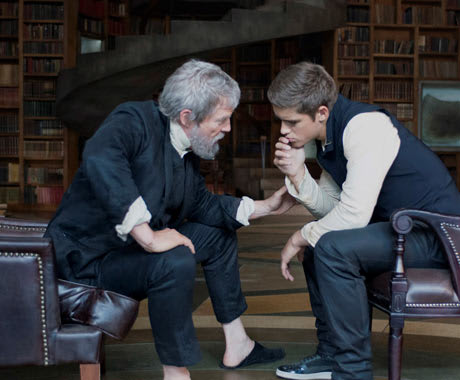Imagine a world without pain. War is over. Hunger and starvation no longer exist. All humankind lives in a state of medically induced melancholy, because to create a base, emotionless median, nobody can experience joy, either. Humour is reduced to a simple cliché or pun. Smiles on faces seem static and sterile. Romance and love are dead. Doesn't sound great, does it?
That's the logical conclusion you're supposed to come to watching The Giver, director Phillip Noyce's (Salt, The Bone Collector) big screen adaptation of the award-winning 1993 young adult novel originally written by Lois Lowry.
The film hews closely to the bestselling story. Jonas (Australian actor Brenton Thwaites) is a young boy living in a society stripped of emotions, in which citizens have predetermined roles and everything has been reduced, both figuratively and literally, to black and white. When Jonas graduates into adulthood at his community's annual "Ceremony," his whole world is turned upside down.
Provided with the power to receive memories, Jonas is forced to work hand-in-hand with "The Giver," a mystical know-it-all played by Jeff Bridges. While other friends of his are trained in the art of euthanizing babies and piloting drones, Jonas is tasked with feeling every natural emotion experienced in human history, all for the purpose of preventing his community from living through the problems of the past.
Soon, Jonas realizes that his universal utopia is actually a dystopia, and that those in control don't have the best intentions for their society. Upset at the current state of things, he plans to break free from his community and restore the positive (and negative emotions) they've been missing out on.
For a sci-fi film, it's a straightforward premise. But where Lowry's novel presented these ideas in clear and concise prose for readers of all ages, this version of The Giver seems streamlined for a small child, pandering to the viewer at every possible turn.
While the original Giver's hero was an 11-year-old boy who could see things other adults could not, the 2014 incarnation of Jonas (now a pubescent 16-year-old) is all wide-eyed and dim-witted, delivering the same aw-shucks demeanour whether he's watching an Italian wedding or an elephant being shot in the face.
The Giver is also fairly clinical in its cinematography. While the film's clean lines and processed hues (or lack thereof) suit the subject matter somewhat well, it's hard not to feel like the film's message would be even more striking given the psychedelic splashes of colour more associated with the rest of the sci-fi genre.
Still, for what it's worth, this is a film ultimately intended for a younger audience, and seeing it through the jaded eyes of an adult is likely a lot different than watching it before you've even experienced most of the emotions mentioned in the film. But for a story known for so acutely discussing negative aspects of Western civilization, it's hard not to feel like The Giver could have treated its audience less like kids and more like, well, young adults.
(eOne)That's the logical conclusion you're supposed to come to watching The Giver, director Phillip Noyce's (Salt, The Bone Collector) big screen adaptation of the award-winning 1993 young adult novel originally written by Lois Lowry.
The film hews closely to the bestselling story. Jonas (Australian actor Brenton Thwaites) is a young boy living in a society stripped of emotions, in which citizens have predetermined roles and everything has been reduced, both figuratively and literally, to black and white. When Jonas graduates into adulthood at his community's annual "Ceremony," his whole world is turned upside down.
Provided with the power to receive memories, Jonas is forced to work hand-in-hand with "The Giver," a mystical know-it-all played by Jeff Bridges. While other friends of his are trained in the art of euthanizing babies and piloting drones, Jonas is tasked with feeling every natural emotion experienced in human history, all for the purpose of preventing his community from living through the problems of the past.
Soon, Jonas realizes that his universal utopia is actually a dystopia, and that those in control don't have the best intentions for their society. Upset at the current state of things, he plans to break free from his community and restore the positive (and negative emotions) they've been missing out on.
For a sci-fi film, it's a straightforward premise. But where Lowry's novel presented these ideas in clear and concise prose for readers of all ages, this version of The Giver seems streamlined for a small child, pandering to the viewer at every possible turn.
While the original Giver's hero was an 11-year-old boy who could see things other adults could not, the 2014 incarnation of Jonas (now a pubescent 16-year-old) is all wide-eyed and dim-witted, delivering the same aw-shucks demeanour whether he's watching an Italian wedding or an elephant being shot in the face.
The Giver is also fairly clinical in its cinematography. While the film's clean lines and processed hues (or lack thereof) suit the subject matter somewhat well, it's hard not to feel like the film's message would be even more striking given the psychedelic splashes of colour more associated with the rest of the sci-fi genre.
Still, for what it's worth, this is a film ultimately intended for a younger audience, and seeing it through the jaded eyes of an adult is likely a lot different than watching it before you've even experienced most of the emotions mentioned in the film. But for a story known for so acutely discussing negative aspects of Western civilization, it's hard not to feel like The Giver could have treated its audience less like kids and more like, well, young adults.




